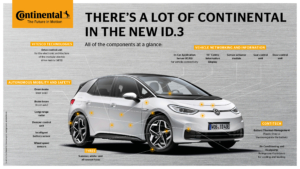Torque from the Top: David Smith, managing director, Continental Tyre Group Ltd
 David Smith, managing director, Continental Tyre Group Ltd (Photo: Continental)
David Smith, managing director, Continental Tyre Group Ltd (Photo: Continental)
Continental Tyre Group Ltd was established in the UK in 1935 as part of Continental AG, a leading global automotive supplier, celebrating its 150th anniversary this year. Continental Tyre Group Ltd manage the sales, marketing and distribution of car, 4×4, van, truck and bus, materials handling, agricultural and earthmover tyres in the UK and Irish markets. The company also runs the successful Conti360° fleet tyre management services with a range of digital solutions to also support commercial fleets. The multi-brand tyre offering in the UK and Ireland incorporates premium brand Continental as well as several well-known, mid-range and exclusive brands such as Uniroyal, Semperit and Best Drive as well as truck retread brands ContiRe and Bandvulc. Continental has made important investments in the UK in recent years through the acquisition of Bandvulc Group Ltd and Tyre Maintenance in 2016 as well as R&J Strang in 2019.
Continental Tyre Group Ltd currently employs around 700 employees in the UK and Ireland. The head office is located in West Drayton, whilst their regional distribution centre is in Rugby, the Bandvulc retread production facility is in Ivybridge, Tyre Maintenance has five tyre depots sites within the UK and R&J Strang run an additional four commercial vehicle tyre depots.
Tyres & Accessories: Has the pandemic made you make any fundamental changes to your business operations? If so, will they continue post-pandemic?
David Smith: Like many businesses, the biggest change we made during the pandemic was the almost overnight transition for all office employees to work remotely. Thanks to continued investment in our IT systems and equipment, and the fact we had just introduced Microsoft 365, we were able to implement this seamlessly as the infrastructure and software was already in place.
Over the last year business meetings moved entirely online, as did our training and development courses, and already it’s hard to imagine what life was like before ‘Teams’.
On the operational side, aside from introducing Covid-safe working practices, everything was pretty much business as usual for our production, warehousing, logistics and fleet management operations.
As the country eases out of lockdown and we start to return to office working we need to find a new normal. Flexible working is definitely here to stay for us but we recognise the importance of being together physically to foster cross-team collaboration and maintain our company culture. Bumping into people in the office and grabbing lunch together are important moments where people get to know one another and build their networks and so we are planning for a ‘hybrid’ working environment, balancing a mix of in-person and remote team working. Similarly, for our sales teams, although in person visits are starting to pick up again, we anticipate online meetings continuing alongside and reducing travel time.
T&A: The ban on sales of internal combustion engine vehicles will mean different tyres to cope with electric vehicles. Are Continental Group’s factories ready to manufacture these in the required numbers?
DS: It is not actually true that electric vehicles require different tyres to internal combustion engine vehicles. (An interesting fact is that the curvature of the road has twice as much influence as the vehicle itself on tyre wear and individual driving behaviour three times as much!) What is true is that the weight and torque of the vehicle can place different demands on the tyres. However, just like with traditional vehicles, all electric vehicles are not the same. They range from small compact cars like Renault Zoe, to high performance models like the Audi e-tron GT or Polestar 2. Vehicle manufacturers will require tyres aligned to the particular performance criteria of the vehicle. At Continental we are certainly experiencing this, and already have many OE approvals on a wide range of electric vehicles with our existing tyre lines.
T&A: Continental has always enjoyed a strong original equipment presence in Europe. What OE homologations has the company achieved for EV tyres?
DS: Almost every third car in Europe is delivered with tyres from Continental and more and more vehicles on the road have an electric drive. This has not changed our success in the original equipment market. As an original equipment manufacturer, we have approvals from many successful electric vehicles, such as the Jaguar I-Pace, Fiat 500 Elektro, Volvo XC40 Recharge, Polestar 2, to name but a few.
T&A: What effect, if any, has Brexit had on your day-to-day business operations?
DS: Brexit has increased our administration effort and cost, but otherwise has not had any significant impact on our day-to-day operations.
T&A: Continental tyres usually perform well in motoring magazine tyre tests. How important do you think these tests are in influencing tyre purchases?
DS: Motoring magazine tyre tests are an extremely important endorsement for a tyre’s performance. They cover a wide range of performance criteria (over and above what is on the tyre label) and provide an independent recommendation based on measured performance.
Especially when looking online, consumers are faced with so many brands with little information provided to differentiate between them – other than price and EU label values – the fact a tyre is a test winner or highly recommended should reassure the consumer that they are buying a good tyre.
T&A: Do you think that the EU tyre label has had a significant effect on tyre choice? Are there any other aspects of performance that you would like to see featured on the label?
Continental Tyre Group Ltd was established in the UK in 1935 as part of Continental AG, a leading global automotive supplier, celebrating its 150th anniversary this year
DS: The EU Tyre Label provides consumers with standardised tyre performance information, enabling them to more easily compare different tyres. It has also forced tyre manufacturers to push the boundaries of tyre technology in the pursuit of further improving fuel efficiency without compromising other safety critical performance factors or tyre mileage. However, following a recent survey we commissioned, we found that only 46 per cent of motorists rated the EU Label as an important consideration. Furthermore, the survey showed that the sustainability of tyre only influences 22 per cent of purchases.
When our survey questioned, what were the most important characteristics when planning a tyre purchase, understandably, many of the respondents ranked value for money as the leading criteria, closely followed by all-weather tyre performance. The UK’s variable weather makes it a prime market for all-season tyres. Continental’s AllSeasonContact won the Auto Express all-season tyre test in its debut year in 2018, came a close second in 2019 and then won again in 2020, culminating in it being awarded Auto Express’s 2021 All-Season Tyre of the Year, an accolade we are all very proud of. It highlights just how committed Continental is to providing drivers with the safest and top-performing choice all year round, no matter the weather conditions.
A large percentage of respondents from our recent survey also rated mileage, fuel efficiency and grip on wet roads as important characteristics when considering what tyre to purchase.
Consumers’ individual priorities, driving style and vehicle type all influence what criteria are important to them and many of these attributes are not listed on the new EU tyre label. For example, consumers with high performance sports cars will likely be more interested in a tyre that offers superior grip and handling attributes rather than fuel efficiency.
Consumers with differing performance requirements can benefit from researching the latest tyre comparison tests and more detailed information on tyre performance from online tyre review sites. Those in the market for tyres can then better evaluate just what they want their tyres to deliver and have a more rounded view on tyre performance overall.
In the future, with increasing pressure on the environmental impact of tyres (outside of just fuel efficiency) we could maybe envisage a ‘sustainability index’ being incorporated on the EU tyre label – reflecting for example on how sustainable the components used in tyre are. We are constantly increasing the sustainability of our production processes and products – in line with our global sustainability strategy. To this end, all materials used in our tyre production are constantly evaluated, and whenever possible, replaced with more environmentally friendly alternatives. Our goal is to have completely sustainable tyres by 2050.
“Torque from the Top” is a regularly feature in the print edition of Tyres & Accessories magazine. Not a subscriber? No problem, click here to become one.




Comments